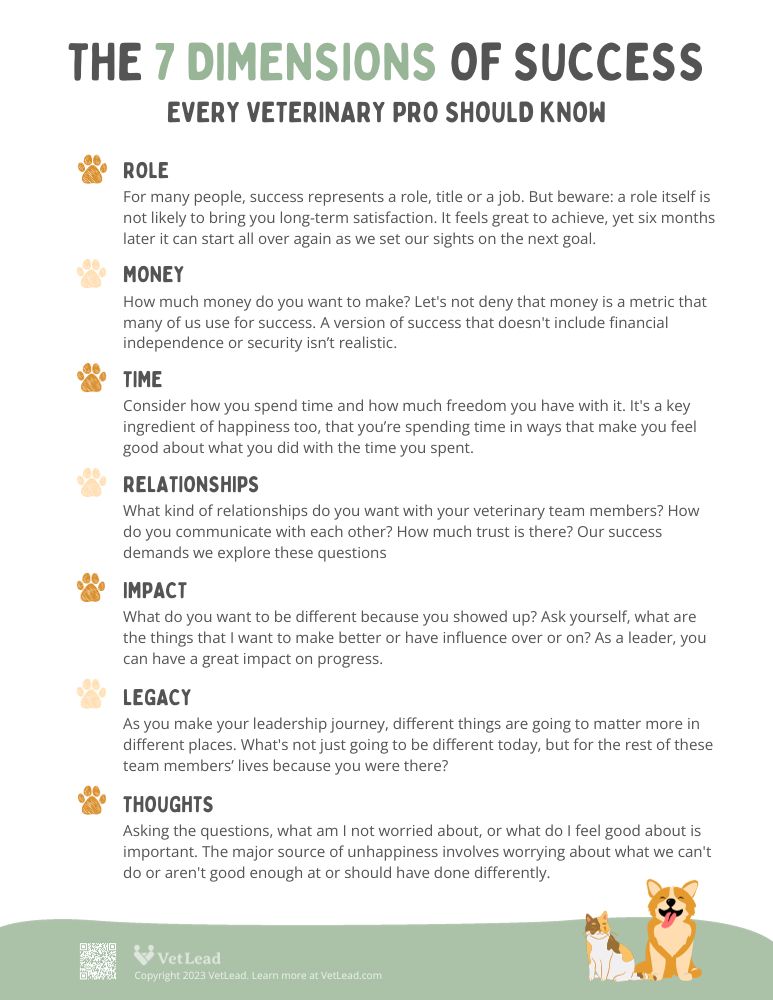Let’s talk about the concept of defining success in your veterinary career. What does success look like to you? Often, it’s one of two things: the role someone wants to have, or, less frequently, what they want their team to look like.
Define success in multiple dimensions
When I say define success, I mean a holistic, complete, comprehensive view of what success looks like; that means that we have to explore it in different dimensions. These dimensions will help you think about it from different angles and create a more complete definition.
You’ve probably heard people say things like, “I need to get my career to this place,” or “I need to have a certain amount of money.” And then, when they get there, they find that they're not happy because they thought success was the one thing.
Don't miss our next live event on Facebook, May 29, 2024.
How to Handel Difficult Client Conversations
Success is never just one thing. It is all the things working together in harmony to create the life you want. If we approach success differently than that, we end up with outcomes that weren't what we expected and aren't the ones we wanted. Now instead of leading well, leaders find themselves having to figure out what's next after building a path to something that they didn't really want.
Create a clear picture of success for yourself

We must make sure to start with a clear picture of success that is beyond just one compelling thing. It doesn't mean we can't have a really compelling thing, we just have to build our definition in harmony with the other things in our world so that we get real success that is not one dimensional. That is not where happiness lives.
1
Role
If you’re a veterinary practice owner, or the practice manager at a thriving hospital, you may already be in the role you want. But for a lot of people inside a practice, success represents a role, title or a job.
There's a huge amount of satisfaction in getting to that level or having that title. But beware: a role itself is not likely to bring you long-term satisfaction. It feels great to achieve, yet six months later it can start all over again as we set our sights on the next goal.
2
Money
How much money do you want to make? Let's not deny that money is a metric that many of us use for success. A version of success that doesn't include financial independence or security isn’t realistic.
So, decide how much money you want at some point in time. It's a great marker and can be exceptionally useful as a tool to measure progress. It's also a great thing to have because of what it gets you, because of what you can do with it, because of how it can affect other things like time, like ability to give back, ability to make a difference, all of those things that you might want in your world. Money can be a tool for that.

3
Time
When you think about time as a dimension of success, consider how you spend it and how much freedom you have with it. Both things are really important to people and are a really big component of what people view as success. It's a key ingredient of happiness too, that I'm spending time in ways that make me feel good about what I did with the time I spent.
One of the most disengaging things for us as humans is the idea that someone else controls my time. We don’t want to spend time in ways that we don't believe serve us, but they are necessary for the previous dimension, money. So, we need to start thinking about how we want to spend our time when we’re successful rather than how we can have enough of it that isn't controlled by somebody else.
4
Relationships
What kind of relationships do you want with your veterinary team members? Obviously these are going to look different than personal or deeper or different relationships that we might have, but it's a really important thing that a lot of leaders don't explore.
That means how do you communicate with each other? How much trust is there? How much candor is there? How often do you get together and think creatively about things? What's the relationship like if they report to you, and with people you report to? Our success demands we explore these questions relative to our relationships.
5
Impact
What do you want to be different because you showed up? Ask yourself, what are the things that I want to make better or have influence over or on? What impacts will occur? Because I do this work because I show up this way because I'm present in life in a certain way. What kind of impact do I want to have?
While leaders cannot make progress for other people, they can help them plan, focus, and practice until progress happens. They can ask questions that challenge the future and cause people to have insights about the contributions they want to make to it. As a leader, you can have a great impact on progress.
6
Legacy
Your legacy is impact on a larger, long-term scale. You may not be in this role forever or I may not be working with these people forever. As you make your leadership journey, different things are going to matter more in different places. That's why it's important to explore them all.

Test Drive a VetLead Membership for Free
Try a 7-day free trial, then keep it for just $39 per month after.
Ask yourself, what legacy am I going to leave when I'm not in this role or working with these particular people? What's not just going to be different today, but for the rest of their lives? Not because you’re gone, but because you built it in such a way that it lasts beyond your ability or need to interact with it on a daily basis.
7
Thoughts
Most of the time that we spend thinking is inside our own head. It is about us. It's about our feelings, it is about our beliefs, it is about our self-talk. What do you want your internal thoughts to be focused on, to be pointed at, to be invested in?
Asking the questions, what am I spending my time on, what am I not worried about, or what do I feel good about is important. The major source of unhappiness involves worrying about what we can't do or aren't good enough at or should have done differently. And so this exercise is really key, because thinking about success is one thing, and we might find a lot of false beliefs about what will cause us to be happy, especially in things we have never had or don't have yet.
Conclusion
Spend time on these things as you think about your definition of success, your role, your money, your time, your relationships, your impact, your legacy, your thoughts. Write those down, and think about where you want to be in 18 months, two years, five years, and even beyond.
If you know what you're working toward, you can figure out what the steps are that move you in that direction.

Download this accompanying PDF Now
Share it with leaders and teams. No email address required.
Will you build your plan for success? Let us know in the comments below.

